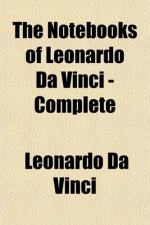656.
We know very well that a really experienced and good painter will not make such mistakes; on the contrary, with sound rules he will remove so little at a time that he will bring his work to a good issue. Again the sculptor if working in clay or wax, can add or reduce, and when his model is finished it can easily be cast in bronze, and this is the last operation and is the most permanent form of sculpture. Inasmuch as that which is merely of marble is liable to ruin, but not bronze. Hence a painting done on copper which as I said of painting may be added to or altered, resembles sculpture in bronze, which, having first been made in wax could then be altered or added to; and if sculpture in bronze is durable, this work in copper and enamel is absolutely imperishable. Bronze is but dark and rough after all, but this latter is covered with various and lovely colours in infinite variety, as has been said above; or if you will have me only speak of painting on panel, I am content to pronounce between it and sculpture; saying that painting is the more beautiful and the more imaginative and the more copious, while sculpture is the more durable but it has nothing else. Sculpture shows with little labour what in painting appears a miraculous thing to do; to make what is impalpable appear palpable, flat objects appear in relief, distant objects seem close. In fact painting is adorned with infinite possibilities which sculpture cannot command.
Aphorisms (657-659).
657.
OF PAINTING.
Men and words are ready made, and you, O Painter, if you do not know how to make your figures move, are like an orator who knows not how to use his words.
658.
As soon as the poet ceases to represent in words what exists in nature, he in fact ceases to resemble the painter; for if the poet, leaving such representation, proceeds to describe the flowery and flattering speech of the figure, which he wishes to make the speaker, he then is an orator and no longer a poet nor a painter. And if he speaks of the heavens he becomes an astrologer, and philosopher; and a theologian, if he discourses of nature or God. But, if he restricts himself to the description of objects, he would enter the lists against the painter, if with words he could satisfy the eye as the painter does.




